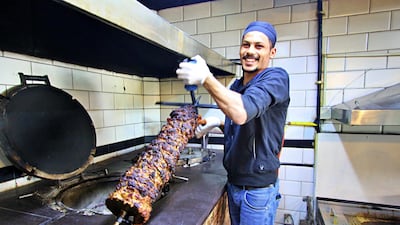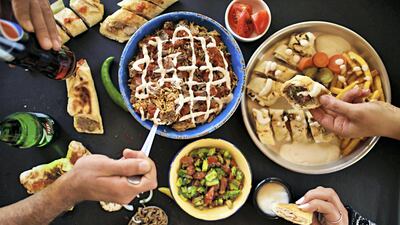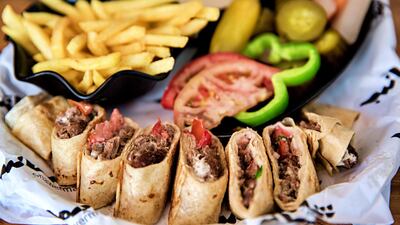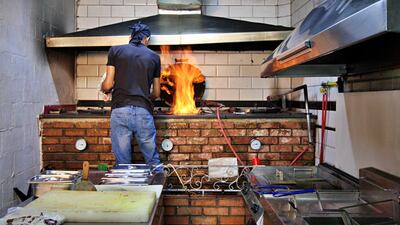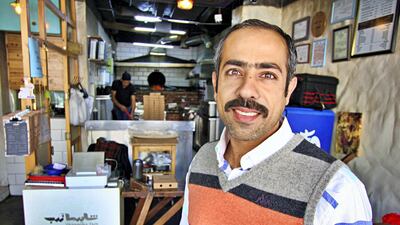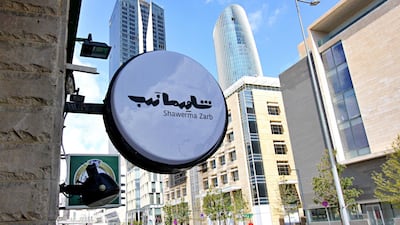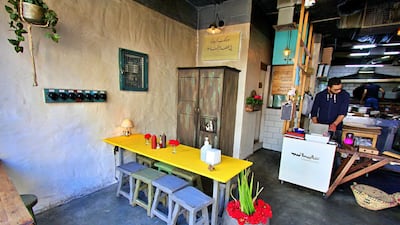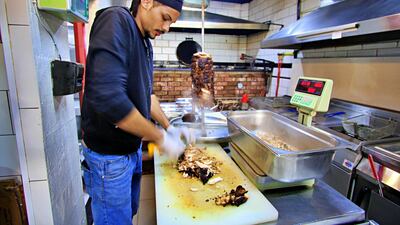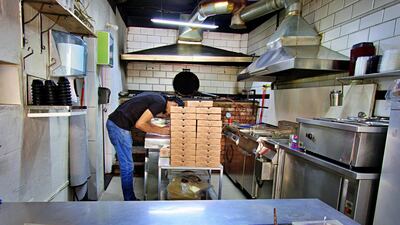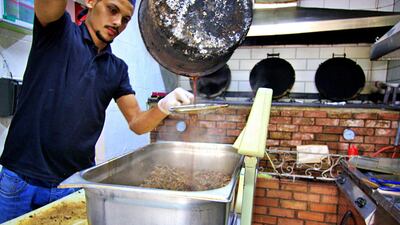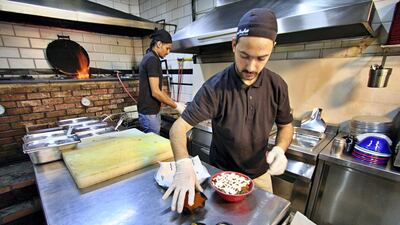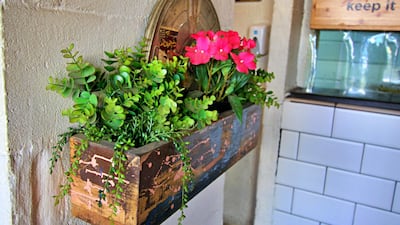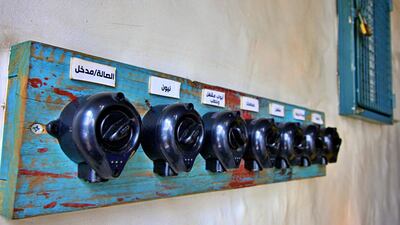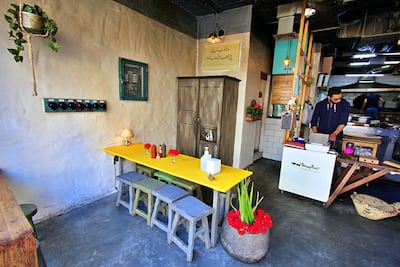Located on a busy street in Jordan’s capital Amman, the glass-fronted Shawerma Zarb restaurant welcomes its customers with trendy, minimalistic interiors and a food concept that isn’t found elsewhere in the city.
With concrete floors and white-washed walls, the design is simple, but quirky touches give it character, such as wooden tables with legs made of metal fencing or old-school Pepsi bottles-turned-vases, which hold brightly coloured blooms. A wardrobe has been remodelled as a waste bin, a row of retro-style switches are mounted on a wall, and low-hanging light fixtures dangle from the ceiling. Colour is splashed throughout, with smatterings of blue paint, green plants and bright yellow tabletops, giving the eatery a simultaneously modern and yet nostalgic feel. It’s a venue you want to spend time in.
Look through the gallery to see more of the venue, staff and food.
Nabil Haddad is Shawerma Zarb's founder. For him, this is about more than just serving food: the contemporary-meets-retro feel of the place is a big part of the business's ethos, which aims to preserve Jordanian heritage while challenging stereotypes and allowing his team to connect with the community. "When the idea for this place popped up in my mind, it was like a lightbulb moment that I just couldn't ignore," Haddad, 35, tells The National enthusiastically.
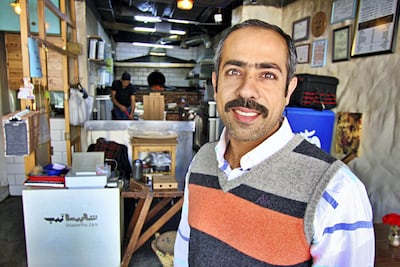
Here you’ll find Middle Eastern street food with a twist; in the kitchen, Haddad uses the ancient Bedouin technique called “zarb”, which involves cooking food over a fire in covered, underground pits. The meat is cooked for several hours and a delicious smokey flavour is the result. “No one else is doing what we are doing,” Haddad says with a proud smile. “I see Shawerma Zarb as a revolution. We are promoting our country’s traditions while providing our customers with an entire experience, working with local suppliers and injecting passion and innovation into an area of food service considered fairly stagnant.”
The idea behind Shawerma Zarb
For the uninitiated, a shawarma, which means “turning” in Arabic, is based on the doner kebab, a dish that was originally invented in Ottoman Turkey. Thin slices of meat – originally lamb, but today usually chicken, turkey, beef or even veal – are shaved from a vertical rotisserie, which turns continuously. Today, it is a popular type of fast food across the region, including in the UAE.
But Haddad is working hard to challenge the perceived notion of what ‘fast food’ is – and can be. Organic juices fill his restaurant’s fridge and all the high-quality ingredients, from the beef brisket to the tomatoes, have been bought from local suppliers, he explains. “We buy the meat fresh every day and carry out the entire process, from cleaning, cutting and marinating, to cooking it.” This kind of attention to detail isn’t easy, though. “Providing fast food via a slow-cooking method is difficult and it has taken a lot of trial and error to get it right.”
In addition to the traditional sandwiches, Haddad’s menu also offers a new kind of dish – his own creation – of meat served on a bed of rice covered in a stew made from fresh tomatoes, traditional spices, lemon and garlic. The beef version is served with tahini sauce. “Serving rice is considered abnormal in shawarma restaurants but it’s a staple part of Bedouin culture,” he says.
A labour of love
He spent three years meticulously planning, researching and pulling together the finances needed to launch his bold new venture in September 2017. He and his wife, Nour, spent time with Bedouin families to learn about cooking techniques and to better understand the origins of their culture. “The Bedouins used to move around a lot so they lacked cooking equipment. As a result of their lifestyle, zarb was the only way they could prepare meals.”
As no one else had done anything like this before, however, the equipment simply didn’t exist. Haddad studied business administration at university and his background is logistics, so his resume certainly does not feature oven design. Yet, he was forced to do exactly that, and get creative. He invented a prototype that simulated the Bedouin cooking technique, eventually scaling it up to create the three ovens that now sit in the kitchens of Shawerma Zarb.
“The idea of bringing a desert oven into the city was scary because it had never been done before,” he says. “There wasn’t much information online, no one had experience of this and even industrial and engineering companies I approached couldn’t help me.” Again, it was a matter of trial and error: Haddad had to build a number of ovens – including the one on his mother-in-law’s roof – until he settled on one that worked. But even then, scaling it up led to disaster. In fact, Shawerma Zarb almost didn’t even happen, as six weeks before the original opening date Haddad seriously considered walking away from it all.
“Nour and I were sitting on the step outside, I was covered in dust and totally exhausted. The ovens weren’t working and I was totally overwhelmed. We’d had to call the fire brigade twice. But Nour was completely supportive and pushed me to keep trying.” He gathered himself together, saw it through and his persistence paid off. The venue is now open seven days a week, with about 1,800 transactions going through the till every week, 20 per cent of which are takeaways. The business’s Facebook page boasts more than 33,000 likes.
'We live in a conservative society'
Some of this success is undoubtedly down to Haddad’s dogged determination, as well as that aforementioned attention to detail, but also because he’s unafraid to take risks. All while offering something unique to customers in Jordan’s food industry, he’s also tackling cultural taboos in a variety of ways.
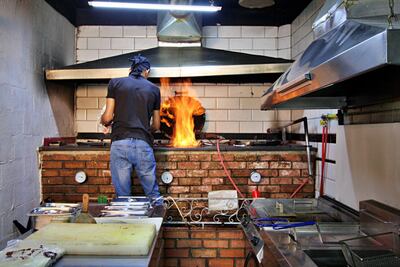
For a start, there’s a community table at Shawerma Zarb, which encourages strangers to sit together. It might be a common sight elsewhere in the world, but in Jordan it’s practically unheard of. “We live in a conservative society where people are not very open,” explains Haddad. “But this is not the case for the Bedouin culture. I wanted to bring this mentality of togetherness into the venue.”
It’s a similar viewpoint he uses to lead his staff – promoting a mentality of teamwork, and deliberately veering away from the traditional hierarchical systems. His team is made up of nine out of 10 Jordanians, something else he says is unusual for the country. More often than not, at shawarma restaurants, you’d find expatriate workers employed instead. “I wanted to change that mindset because I believe it is important for local people to be proud to work with their local food.”
There are also two women on the payroll, which is again uncommon. In 2016, women accounted for just five per cent of the 52,104 employees in the hospitality industry, according to figures from Jordan’s Department of Statistics.
Abed Alrhman Nashat Talwzy, 21, has been a member of staff at Shawerma Zarb for one year. He admits working alongside women was a new experience for him. "Customers were very surprised to see a lady behind the counter," he tells The National. "In fact, it took me a little while to get used to but now I consider it to be normal.
“It’s so different here. There is a passion that you don’t find in other restaurants.”
As he continues to break down boundaries in business and local society, Haddad is also working to build this into a global brand. In fact, he’s already in talks with investors regarding expansion into Europe. “I hope the concept of zarb in fast food will grow and Amman becomes a destination for this type of shawarma.”
